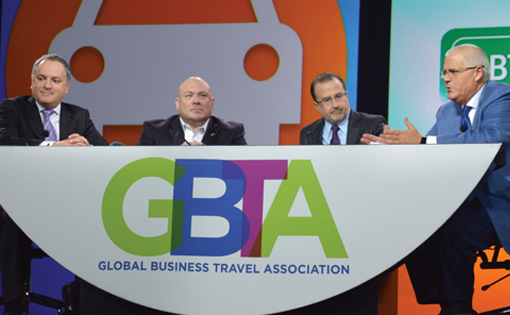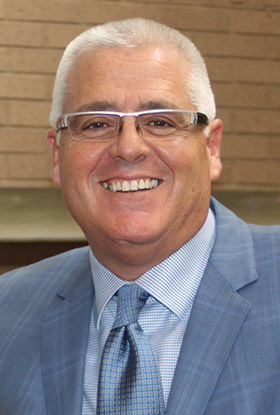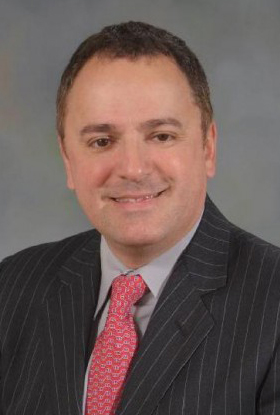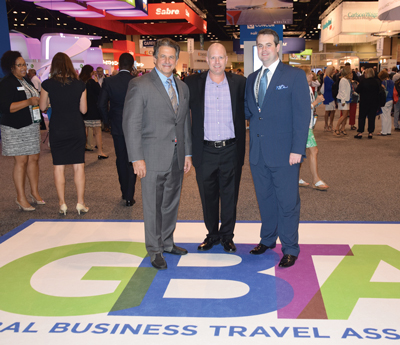 L to R: GBTA Allied Leadership Council President Scott Solombrino of Dav El/BostonCoach, John Rose of iJET International, GBTA Executive Director and COO Michael McCormick, and David Seelinger of EmpireCLS Worldwide Chauffeured Services
The Global Business Travel Association (GBTA) held its 2015 convention July 25-29, which was one of the association’s largest conventions in its history with 6,389 attendees—including 1,366 travel buyers and more than 400 exhibitors on the show floor. Chauffeur Driven Publisher Chris Weiss was among those present for the multi-day event.
L to R: GBTA Allied Leadership Council President Scott Solombrino of Dav El/BostonCoach, John Rose of iJET International, GBTA Executive Director and COO Michael McCormick, and David Seelinger of EmpireCLS Worldwide Chauffeured Services
The Global Business Travel Association (GBTA) held its 2015 convention July 25-29, which was one of the association’s largest conventions in its history with 6,389 attendees—including 1,366 travel buyers and more than 400 exhibitors on the show floor. Chauffeur Driven Publisher Chris Weiss was among those present for the multi-day event.
Much of the conversation focused on the sharing economy, competition, and technology: The future of not only airline competition but also travel distribution’s landscape, the choice to either disrupt or be disrupted, technology’s effect on the customer experience, customers’ desire for their booking experience to mirror the ease of their online consumer experience, and the rise of services like Airbnb and TNCs were among the timely topics explored.
As one of the largest gatherings of travel professionals in the world, the annual conference both draws from and delivers a wide swath of content to a membership base that spans six continents. It brings together professionals from all walks of the travel industry for an event that offers panels, guest speakers, educational programs, and an expansive expo floor.
 Apple cofounder and philanthropist Steve Wozniak and interviewer Nina Easton
The diverse lineup of speakers included those beyond the scope of the industry: actor Kevin Bacon, who discussed his Six Degrees Foundation that puts grassroots charities in touch with celebrities; Apple co-founder and philanthropist Steve Wozniak was interviewed by Fortune’s Nina Easton and spoke about technology’s impact on travel; and Fox News journalist Megyn Kelly spoke to GBTA’s Executive Director and COO Michael McCormick in a Q&A about her personal and professional life.
Apple cofounder and philanthropist Steve Wozniak and interviewer Nina Easton
The diverse lineup of speakers included those beyond the scope of the industry: actor Kevin Bacon, who discussed his Six Degrees Foundation that puts grassroots charities in touch with celebrities; Apple co-founder and philanthropist Steve Wozniak was interviewed by Fortune’s Nina Easton and spoke about technology’s impact on travel; and Fox News journalist Megyn Kelly spoke to GBTA’s Executive Director and COO Michael McCormick in a Q&A about her personal and professional life.
On Tuesday, July 28, McCormick led the four-person panel “Ground Transportation in a Sharing Economy.” He was joined by GBTA Allied Leadership Council President Scott Solombrino of Dav El/BostonCoach, David Seelinger of EmpireCLS Worldwide Chauffeured Services, and John Rose of iJET International. During the panel, new data was presented that showed how many companies have yet to implement a policy regarding employees’ use of TNCs for business-related transportation. The panelists agreed that while there are some impressive new technologies on the market, travel buyers need to ensure that such services will deliver a high duty of care standard. They also called for a level playing field to allow for a fair, competitive marketplace.
Check out our interview below with Seelinger and Solombrino.
The 2016 GBTA Convention is scheduled for July 16-20 in Denver, Colo.
Q&A
 David Seelinger of EmpireCLS Worldwide Chauffeured Services
INDUSTRY ICONS David Seelinger of EmpireCLS Worldwide Chauffeured Services and Scott Solombrino of Dav El/BostonCoach dominated their four-person panel held on the penultimate day of GBTA’s 2015 Convention this July, the video of which can be found at bit.ly/1MxisbI. “Ground Transportation in a Sharing Economy,” which also featured John Rose of iJET International and was moderated by the association’s Executive Director and COO Michael McCormick, gave both Seelinger and Solombrino ample opportunity to discuss just how TNCs are affecting ground transportation as well as the travel industry at large. The GBTA Foundation, the association’s research and educational arm, published its 2015 Ground Transportation Study on the same day of the panel. The survey’s results yielded a range of telling data, including how TNCs are the least-used form of ground transportation in business travel.
David Seelinger of EmpireCLS Worldwide Chauffeured Services
INDUSTRY ICONS David Seelinger of EmpireCLS Worldwide Chauffeured Services and Scott Solombrino of Dav El/BostonCoach dominated their four-person panel held on the penultimate day of GBTA’s 2015 Convention this July, the video of which can be found at bit.ly/1MxisbI. “Ground Transportation in a Sharing Economy,” which also featured John Rose of iJET International and was moderated by the association’s Executive Director and COO Michael McCormick, gave both Seelinger and Solombrino ample opportunity to discuss just how TNCs are affecting ground transportation as well as the travel industry at large. The GBTA Foundation, the association’s research and educational arm, published its 2015 Ground Transportation Study on the same day of the panel. The survey’s results yielded a range of telling data, including how TNCs are the least-used form of ground transportation in business travel.
Chauffeur Driven recently spoke with Seelinger and Solombrino about GBTA, its survey, the content of and reactions to their panel, TNCs, and the future of chauffeured transportation.
Chauffeur Driven: Why do you think the vast majority of respondents of the GBTA survey (71 percent) noted they are processing and paying ride-sharing expenses but do not have a specific policy in place?
Scott Solombrino: We think that companies don’t really understand what they’re paying for right now. TNCs are so new and now that it’s becoming a bigger-expense line item, they’re starting to realize that there are times when people are paying more than what they would have normally paid their contracted provider, and there are people using these services who have never really been authorized to use any type of car service. Based on what I’m hearing from travel managers, for the first time, companies are realizing they have a control problem.
CD: Twenty-four percent of respondents said their policy forbids the use of ride-sharing services. What are some of the reasons they have shared as to why their policies forbid it?
David Seelinger: At GBTA, one of my largest customers said, in many cases, they’ve found that the TNC rate is almost double what the contracted rate is. He also said, “We do not endorse them because we have great concern for corporate liability and for the safety of the traveler.”
 Scott Solombrino of Dav El/BostonCoach and GBTA Allied Leadership Council President
SS: Companies are figuring out that people are doing it, first of all. And when you bring in the whole surge pricing [issue], it becomes that much more dramatic because corporations are now coming to the conclusion that TNCs aren’t necessarily cheaper, and they’re realizing just how many people are out of policy. What I think you’re going to see in the upcoming months is if these TNCs don’t sit down and have negotiated corporate plans—which they don’t want to do and they’ve not done yet—companies will start to ban them. One of the biggest banks on Wall Street told me that 68 percent of their ground transportation spend is out of policy on TNCs: To me, this is an opportunity for us on the chauffeured car side to educate the finance departments of these corporations.
Scott Solombrino of Dav El/BostonCoach and GBTA Allied Leadership Council President
SS: Companies are figuring out that people are doing it, first of all. And when you bring in the whole surge pricing [issue], it becomes that much more dramatic because corporations are now coming to the conclusion that TNCs aren’t necessarily cheaper, and they’re realizing just how many people are out of policy. What I think you’re going to see in the upcoming months is if these TNCs don’t sit down and have negotiated corporate plans—which they don’t want to do and they’ve not done yet—companies will start to ban them. One of the biggest banks on Wall Street told me that 68 percent of their ground transportation spend is out of policy on TNCs: To me, this is an opportunity for us on the chauffeured car side to educate the finance departments of these corporations. CD: We are constantly reading about TNC drivers’ questionable driving or criminal records. Why do you think this hasn’t raised more of a red flag in the corporate travel community, as well as with regulators and politicians?
SS: They have a machine like no one has ever seen before prior to a public offering. They have dozens of public relations and digital media firms manipulating where the search items come up, boosting the good stories and getting rid of the bad ones. When Microsoft and Apple went public, they didn’t have criminal issues to worry about: Those companies were truly technology companies. This company is an old-school transportation company with new technology attached to it, so they have all the ugly stuff that happens in employing an unmanaged workforce comprising tens of thousands at a low-income salary. But they’re just better at managing these outcomes—if the chauffeured car industry had a rape next week, it’d be on the front page for days. But you have to give them credit: They have learned crisis management like no one I’ve ever seen and are absolutely executing it in the perfect way because the public is not screaming.
DS: The corporate travel community has never experienced incidents with our industry as they are seeing with the TNCs. Many companies are still trying to get their arms around how to regulate the use of TNCs. The NLA, TLPA, and many other nonprofit organizations like AFT (Advocates for Fairness in Transportation) are working diligently on educating the corporate travel community about the risk of using TNCs due to their lack of thorough background checks. Until they start doing fingerprint background checks or have a third party administer the process, they will continue to get negative press. Let’s face it: Using a TNC that may be operating illegally and letting anyone drive is just digital hitchhiking.
Regarding the regulators and politicians: It’s the same old story of special interest groups and direct contributions to political policy makers. Our industry can’t compete with a company that has hundreds of lobbyists and attorneys working day and night to make sure they get any votes they need. Our industry is putting up a fight but it’s an uphill battle.
CD: How do upstanding TNC drivers who just want to make a few extra dollars fit into the equation?
DS: A big challenge for TNCs will be retaining drivers without paying them for overtime or providing benefits that employees receive. As TNC drivers see how much power they have, they can change how they are treated and more class action lawsuits may be filed all over the country. I think another long-term challenge will be service consistency. Many TNC drivers I’ve spoken to say it’s hard to make a living with all the expenses they have, which is why they try to only work when the surcharge is on; when it’s off, they try to do work for traditional car companies. TNCs need to get a handle on background checks and stop putting just anyone who applies on the road.
SS: How happy could a TNC driver be when he doesn’t have a health care plan, he can’t unionize, he doesn’t get unemployment if he gets fired, he doesn’t get overtime—why is that not the bigger story? We talk about this all the time in the context of other industries, like the garment industry—people always say, “Oh, those sweatshops are slave drivers, the workers have no rights,” and then everyone puts a little protest together. Why isn’t there a movement in the corporate professional travel sector saying that businesses won’t work with a company that doesn’t pay people or treat their employees properly? These are not people who are treated properly at all. And that has not resonated with consumers. It’s resonating in Washington right now but that’s about it. The general public doesn’t seem to care who’s driving them around—which is really frightening.
CD: Do you think that the TNCs ultimately will conform or the industry as we know it is going to deregulate?
SS: In my opinion, there’s no chance that the industry deregulates. I don’t see any appetite for that in Congress, so I don’t even think that’s on the table. And I think that what TNCs are looking at is the driverless car, in terms of how they’re going to come up with a solution and making a bet as to when driverless cars are going to be available in the marketplace. Because if you’re any of the TNCs, if the whole thing can be computerized and without any labor, you don’t have a problem anymore. If there’s one weakness they have, it’s that their business model is wrong. If you look at how many lawsuits are out there, how many regulatory people are after them: Every country in the world is having a problem with them right now, every taxi organization is going after them.
CD: Do you think it’s the responsibility of the GBTA to educate the community about ride-sharing?
DS: It’s the industry’s responsibility to educate the corporate travel community on the risks associated with using TNCs. GBTA can provide us the forum—as they did at the convention—to pass along factual information. Our industry’s biggest challenge is educating the end user on the risks of TNCs while we work toward finding a software platform that would provide our customers with an on-demand feature for safe and consistent chauffeured transportation. What was interesting about the session Scott and I did is that all the TNCs are GBTA members, but they all declined to participate in our panel. The message they sent was clear: “We don’t care about these issues; we only care about growth so we can get our IPO done as soon as possible before everyone figures out how bad our model is.”
SS: I don’t think GBTA really is the policeman here—it’s a mechanism to allow people like David and me to educate the corporate customer. GBTA can put the spotlight on the issue but it can never become the advocate because there’s too much pressure.
We had a message to get out to the 4,000 people who were in that room. GBTA gave us a great platform because now we have a video of our session (which can be seen at bit.ly/1MxisbI). It’s an excellent promotional tool because you have the GBTA moniker, it’s a GBTA-branded event, and David and I really highlighted why companies have to pay attention. And I can’t tell you how many people said, “That was the most eye-opening education experience I’ve had in years.”
CD: TNCs have implemented strategic alliances with corporate travel industry powerhouses (like Concur, United Airlines, and American Express). Why do you think that they are not seeing things for what they are?
SS: I love the people at Concur but at the end of the day, they’re transaction people. All they want is to know how many transactions they have populated into people’s expense reports. And these TNCs gave them an easy platform with the right technology and it’s a simple transaction—that’s all they care about. What’s disappointing to me is when you see an airline, like United, that has hooked onto this whole thing before TNCs were even legally operating in airports. I find that to be really reprehensible. I don’t understand how you can recommend a service that isn’t guaranteed legally to be able to pick up or drop off at every single airport.
DS: For them, it’s about anything that drives revenue. All they see is a lot of people using TNCs: They want to be integrated, which results in more revenue. That’s how they look at it. So it’s not surprising to me that all of these companies are latching on and getting a piece of it.
Everything these companies do is driven by demand or the ability to generate more revenue. It turns my stomach when I see some of the airlines and other platforms offering Uber, but let’s see what happens in the future.
CD: What are your customers giving as their reasons for using TNCs?
SS: I have to give TNCs some credit: They’ve created a whole new generation of people who now use chauffeured services at one level or another and normally wouldn’t. If it’s bad for anybody, it’s bad for the rental car people, in my opinion, because why would you ever want to rent or own a car if you’re in a major city and you can just pull out your phone and somebody comes to pick you up? You don’t need a car. So that, for us, could be a good thing: If there’s ever a level playing field and our technology is then parallel with theirs, we can all expect better growth because how you use a car has changed, and they’ve created a new market of users who want to be driven by somebody else. I do believe they’ve done a good job of broadening the market.
DS: For the most part, it’s ease of use—and it’s much easier than a taxi. Once we have a level playing field and our industry unifies around a common platform, as we are working toward now, we will be able to give our consumers the convenience they desire but in a safe and consistent environment.
CD: Are there certain factions of the corporate travel community that don’t understand why you’re fighting the TNCs and have accused you of trying to slow progress and technology?
SS: The travel manager of a company we work with came up to me and said, “You need to lay off TNCs and get off this subject. There’s enough business for all of you.” And I said, “How dare you not understand exactly what these people have done in our sector and how the regulatory stuff has been completely thrown out the window. We’re not going to have this discussion.” And he completely backed off.
There is a group of people out there saying, “We want more of this, we should all being doing it, everybody should only use Airbnb, and everybody should only use a TNC car.” And the rest of us mean nothing. It’s offensive when you hear it, and then when you explain to people what your position is, they tend to calm down very quickly because what I say to them is, “What if your employer came to you and said that you’re now an independent contractor; we won’t pay your health benefits, workers’ comp, overtime, vacation time; and if you get laid off, you’re not getting unemployment.” You would not work for that company for very long.
DS: It’s all about educating the travel buyer and end user. Once the travel community understands the bigger picture, they start to see our position. I love technology and I think the TNC apps are fantastic, but we just need a level playing field. We need more industry players involved in educating people—NLA, TLPA, AFT, and many more nonprofits need support and action from all their members to help with education.
CD: Do you see more consolidation within the industry, especially in terms of midsize and smaller companies getting eaten up?
SS: It is a shrinking sector. If I were totally dependent on the industry, I’d be looking for other things we could be doing because in the next five years, there will most likely be significantly fewer companies in the market. Everybody’s kind of looking out there saying, “Hey, what’re you going to do next?” I started in this business when I was 18 years old—I’m 55. I’ve seen three generations of ownership flip and change, and I can tell you that the kids of the kids don’t want to be in this business. There are a lot easier ways to make money. There are tons of people in this business who are established operators between ages 45 and 65 who would sell tomorrow if the right deal came along. They wouldn’t even hesitate because the business has gotten so complicated, it’s gotten too competitive, there are these outside factors that have influenced the ability of people to grow and survive in the market—such as TNCs—and a lot of people don’t want to deal with that.
It’s not the stable industry it was 10 years ago. That creates opportunities for certain operators who aren’t shying away from TNCs to say, “Hey, if I can consolidate a whole bunch of companies with solid brands and great balance sheets that are making money every day, then I can scale those costs and we can make more money.” There are people in the industry who are seeing that it’s a great time to grow because there will be fewer chauffeured car companies in two, three, or four years. This business has plateaued. It’s gotten too complicated, too regulated, too difficult, too hard for the insurance to get done, too hard for the financing: People are looking to exit, not enter. These are warning signs and, hopefully, people will wake up and pay attention.
 L to R: Edward Sakakeeny of Carey New Orleans/Signature Livery, CD Publisher Chris Weiss, and Matt Assolin of Nikko's Worldwide Chauffeured Services
CD: What are your individual companies and the industry as a whole doing to compete with TNCs’ “better mousetrap” and the convenience of on-demand service?
L to R: Edward Sakakeeny of Carey New Orleans/Signature Livery, CD Publisher Chris Weiss, and Matt Assolin of Nikko's Worldwide Chauffeured Services
CD: What are your individual companies and the industry as a whole doing to compete with TNCs’ “better mousetrap” and the convenience of on-demand service? SS: We have had our own back-end app operable for a year already. You can track the car, see the chauffeur, the whole nine yards. The problem that the industry seems to face is supply, not technology. The tech is the easier of the two parts of this, and it doesn’t mean anything if the public pushes that button and doesn’t get fulfillment—they will never come back. You need 15,000 to 20,000 cars a day in New York for 100,000 transactions, and that is what’s rumored—because I could never tell you if it’s really true or not—to be what TNCs are doing every day in New York. The cities that matter most are New York, Boston, L.A., San Francisco, Chicago, and Washington: Whoever can control the largest metropolitan markets in the U.S. will win the war.
The reason we’re having a hard time with the supply is that we’re trying to fill cars with legitimate chauffeurs. Our standard of care is so much higher than TNCs’ that it’s really a monumental challenge. And if our industry could pool its supplies in those major markets every day on a three-to-five minute on-demand basis, then you have a chance to dislodge the existing TNC players with people who are legitimate in the business. The industry needs to take off its rose-colored glasses and see that until people can get together to figure out how to fix that supply, it doesn’t matter what platform you’re on. As long as you have a GPS component and it bills credit cards directly, customers couldn’t care less about the technology. It just has to be usable and convenient.
We have to work really hard at the NLA to get the rules enforced, to get the laws changed, to put the firewalls up between us and these TNCs, and to support the taxi industry—which is also under fire and, for 50 years, was our enemy. That’s what’s so ironic about this: It’s made for strange bedfellows. During the GBTA panel, I spent five minutes defending the taxi sector. I feel as though they’re obeying the rules, so why shouldn’t these other companies?
DS: What’s exciting to me is seeing our industry unify on these common issues. I see a great future, as long as we think smart and support a common solution—this is not a time for everlasting debate. I’m very happy to see so many companies signing up with Deem for the app that’s being developed for our industry. I’m not saying Deem is the only answer but we do need to get started. I have talked to so many corporate travel decision-makers who tell me it’s a long-overdue solution for the ground transportation space. We must come together as an industry and get on a platform that can provide the end user with our individual and joint services for supply.
We all have to look at new technology to enhance our businesses and make them more profitable by using depressed inventory through the on-demand feature. I encourage operators to do their homework and find a common solution. I, along with many operators across the country, have chosen Deem: It takes millions to build an app that we can all benefit from and, from what I see, they’re not far from that goal. I hope people take notice of what needs to be done and get moving forward before we’re all left behind.
CD: Any closing thoughts?
DS: We need unity. Let’s all get on the same train so we can get to the station fast. We don’t have time: We must get moving with education and application development. Become a part of the solution by using tools provided by NLA, TLPA, and AFT to educate your customers while we all work on a common solution for on-demand application. This is the opportunity of a lifetime, so let’s not miss it by waiting to be saved. Let’s save ourselves.
SS: This industry is under siege. The whole sector is under attack. If we succeed, we will have pulled off the greatest reversal in the history of American business as a small industry that had no money, limited influence, and had one thing on their side—the law. If we don’t succeed, then companies will have to operate in a much different environment, it’ll be a smaller industry with a few big players trying to compete, and the industry’s growth levels will be stifled for years to come. The next big challenge for us will be the driverless car: I’m not sure the public’s going to accept it, but the technology is there for it to be the next major disruption. We have to win this fight to guarantee our own safety and our own future. [CD0915]

